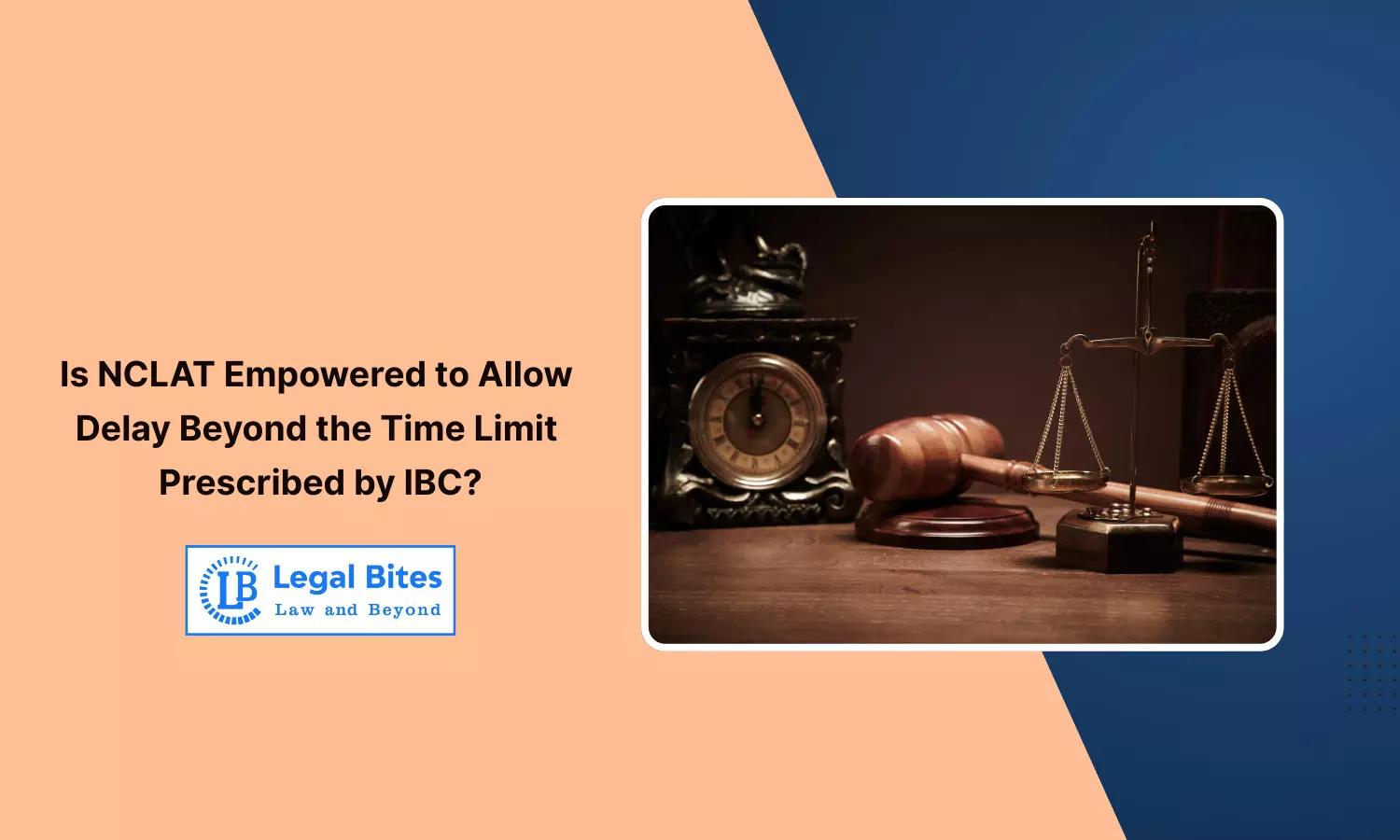
The Insolvency and Bankruptcy Code, 2016 (IBC), is a time-bound framework enacted to ensure the speedy resolution of insolvency cases. Central to this framework is strict adherence to procedural timelines, including those governing appeals under Section 61 of the Code. A critical question that arises is whether the National Company Law Appellate Tribunal (NCLAT) can condone delays in filing appeals beyond the statutory limits prescribed by the IBC.
This issue was conclusively addressed by the Supreme Court of India in the judgment delivered on 7 May 2025, in Tata Steel Ltd. v. Raj Kumar Banerjee & Ors. [C.A. No. 408 of 2023], which set aside an NCLAT order condoning a delay beyond the statutorily permissible period.
This article analyses the statutory framework, the reasoning of the Court, and the broader legal principles governing the condonation of delay in IBC appeals.
Statutory Framework: Section 61 IBC and Limitation
Section 61(2) of the IBC provides:
“Every appeal under sub-section (1) shall be filed within thirty days before the National Company Law Appellate Tribunal:
Provided that the Appellate Tribunal may allow an appeal to be filed after the expiry of the said period of thirty days if it is satisfied that there was sufficient cause for not filing the appeal but such period shall not exceed fifteen days.”
The provision is explicit: the NCLAT can condone a delay of up to 15 days beyond the initial 30-day period. The outer limit for filing an appeal is thus 45 days.
Additionally, Section 238A of the IBC makes the Limitation Act, 1963 applicable “as far as may be” to proceedings under the Code. However, the extent to which this applicability affects the hard stop imposed by Section 61(2) has been a subject of litigation.
The Case in Focus: Tata Steel Ltd. v. Raj Kumar Banerjee & Ors.
Factual Background
- The NCLT approved Tata Steel’s resolution plan for Rohit Ferro-Tech Ltd. on 07.04.2022.
- Respondent No. 1, a minority shareholder, filed an appeal before the NCLAT on 24.05.2022, accompanied by an application to condone a 15-day delay.
- NCLAT condoned the delay and allowed the appeal.
- Tata Steel challenged the order in the Supreme Court.
Issues
- Whether the appeal was filed within the prescribed limitation and condonable period under Section 61(2) of the IBC?
- If not, whether the NCLAT had the jurisdiction to condone the delay beyond this period?
Supreme Court’s Ruling
On Computation of Limitation
The Court reaffirmed that the 30-day limitation under Section 61(2) IBC begins from the date of the NCLT order and not from the date of knowledge, unless specific facts justify otherwise. It held:
“The limitation period for filing the appeal commenced on 07.04.2022 and expired on 07.05.2022. The condonable 15-day period ended on 22.05.2022.”
Respondent No. 1 physically filed the appeal on 24.05.2022, exceeding the statutory outer limit.
On Section 4 of the Limitation Act
The respondent had argued that 07.05.2022 was a Saturday and hence a court holiday, invoking Section 4 of the Limitation Act. The Court rejected this, clarifying that:
- Saturdays are working days for the NCLAT Registry.
- Section 4 applies only when the last day of the prescribed period (i.e., the initial 30 days) falls on a holiday.
- Section 4 does not extend the condonable period of 15 days.
This was consistent with the jurisprudence laid down in Assam Urban Water Supply [(2012) 2 SCC 624] and Sagufa Ahmed [(2021) 2 SCC 317], where the Supreme Court held that the “prescribed period” refers to the limitation under the Limitation Act and not the discretionary extension period.
Jurisdictional Boundaries of NCLAT
Crucially, the Court reiterated that NCLAT has no power to condone delays beyond the 45-day period:
“Where a statute expressly limits the period within which delay may be condoned, an Appellate Tribunal cannot exceed that limit.”
The Court relied on precedents including:
- Kalpraj Dharamshi v. Kotak Investment Advisors [(2021) 10 SCC 401]
- V. Nagarajan v. SKS Ispat [(2022) 2 SCC 244]
- Bhimashankar Sahakari Sakkare Karkhane v. WIL [(2023) 8 SCC 453]
These cases clearly establish that the IBC’s timelines are mandatory and inalterable, and tribunals cannot invoke equitable principles to stretch these limits.
Broader Legal Implications
1. Finality and Speed in IBC Proceedings
The Court emphasised that the IBC is a complete code with strict timelines designed to avoid delay. Allowing tribunals to condone delay beyond the statutory limit would undermine the Code’s objectives of efficiency and time-bound resolution.
2. Limited Role of Section 4 Limitation Act
The judgment clarifies that Section 4 of the Limitation Act only applies to the initial limitation period and not to condonable extensions. This distinction is vital in avoiding confusion and ensuring litigants act diligently.
3. No Equitable Jurisdiction
NCLAT cannot invoke equitable principles to override statutory timelines. As the Court noted, doing so would “open the floodgates to belated and potentially frivolous petitions.”
Conclusion
The Supreme Court’s decision in Tata Steel Ltd. v. Raj Kumar Banerjee & Ors. sets a clear precedent: NCLAT has no power to condone delay beyond the period specified in Section 61(2) of the IBC. This interpretation reinforces the sanctity of timelines under the Code and discourages procedural laxity. For stakeholders in insolvency proceedings—including creditors, resolution applicants, and minority shareholders—this judgment serves as a critical reminder to exercise due diligence and act promptly.
The ruling ensures that insolvency proceedings retain their time-bound character, a cornerstone of the IBC’s framework.